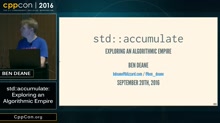Your own error code--Andrzej Krzemieński
The stl can help you!
Your own error code
by Andrzej Krzemieński
From the article:
I was recently implementing the “classification of error conditions” in my application offered by the functionality behind
std::error_code. In this post I want to share some of my experience and insight.

 Have you registered for CppCon 2017 in September?
Have you registered for CppCon 2017 in September?  Have you registered for CppCon 2017 in September?
Have you registered for CppCon 2017 in September?